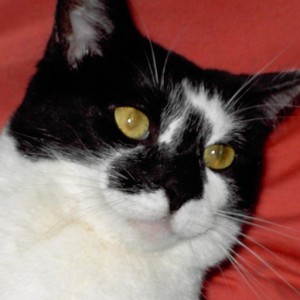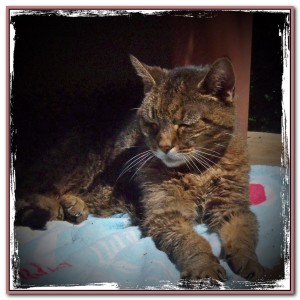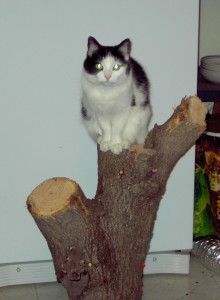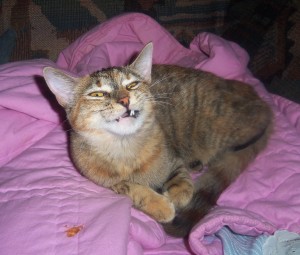Hyperthyroidism And Fish

The world famous Ambrose Butterbutt who has thyroid issues.
Hyperthyroid disease in cats is at an epidemic level. My mother has lost 2 cats to it, she has another right now and I have one with it as well so this topic hits close to home.
Hyperthyroidism has been researched heavily and some conclusions have been reached. As it turns out, the safety of you and your family can cost you your cat. Here’s some of an article from the healthy pets website footnote[note]Healthypets.com[/note] footnote via The National Library of Medicine. footnote[note]National Library of Medicine[/note]
More research has recently come to light linking flame retardants to hyperthyroidism in cats. The latest study was published this past March in the journal Environmental Science & Technology.
The researchers analyzed the blood from 60 pet cats for the presence of flame retardant chemicals, specifically decabromodiphenyl (BB-209), polybrominated diphenyl ethers (PBDEs), hydroxylated PBDEs (OH-PBDEs), and 2,4,6-TBP. The research team wanted to study the differences in the levels of these chemicals in healthy and sick cats diagnosed with hyperthyroidism.
Of the 60 cats, 23 had normal thyroid function and 37 were hyperthyroid. The study results showed that the hyperthyroid cats had higher blood levels of PBDEs on a fat weight basis.
The study finds that older cats are at higher risk which is a logical leap of deduction – the older the animal is, the more of the poison it will injest over time and thus causing the Hyperthyroidism.
But there’s another theory that is making the rounds and that is fish based cat food. Again, my mother never feeds her cats fish based food yet has had cats with Hyperthyroidism. Yet, I have a cat that loves fish based cat food and also has Hyperthyroidism, so one is left to wonder if there are multiple causes for this condition footnote[note]Petmed article[/note].
First some background. Hyperthyroidism is a usually caused by a benign tumor within the thyroid gland that secretes large amounts of thyroid hormone. One of the primary functions of this hormone is to regulate an animal’s metabolism. Cats under the influence of too much thyroid hormone have a greatly increased metabolic rate, leading to the classic symptom of weight loss despite a ravenous appetite. Elevated thyroid hormone levels can also lead to high blood pressure, a type of heart disease called hypertrophic cardiomyopathy, vomiting, diarrhea, and increased thirst and urination.
In most cases, hyperthyroidism can be diagnosed when a cat has high circulating levels of thyroid hormone (total T4 or TT4) in conjunction with typical clinical signs. Additional forms of thyroid testing may be necessary in complicated cases. Treatment varies depending on the cat’s overall health and owner finances, but options include radioactive iodine therapy, daily medication, a low-iodine diet, and surgical removal of the thyroid gland.
So, the only thing to do is once they get to a certain age, talk to your vet about getting a blood screen done once a year, especially if the cat begins to lose weight and still eats like a wolf.



 The late Ted Bird, age 22
The late Ted Bird, age 22
 Peanut Butter, age 16
Peanut Butter, age 16
 Little Ted Bird, age 6 months
Little Ted Bird, age 6 months
 The late Sweetie Pie
The late Sweetie Pie
 The late Sweetie Pie
The late Sweetie Pie